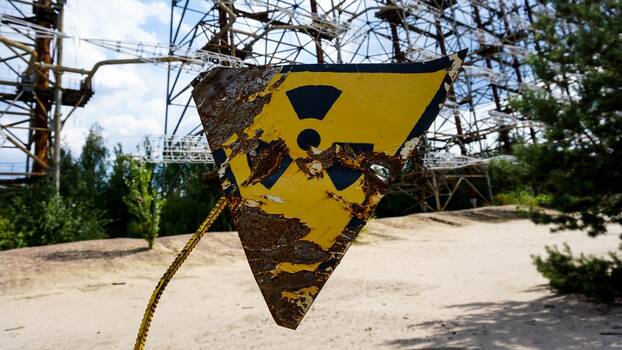
Is nuclear energy undergoing a revival? In light of the worsening climate crisis, several countries are again proposing to increase the use of nuclear power to cut emissions. Most recently, France’s president Emmanuel Macron made the controversial proposal to declare nuclear power a “renewable energy” as part of the EU’s Green Deal.
Patrick Schukalla is a geographer who works on resource policies and the nuclear industry, with a particular focus on the history and present of uranium exploration in Tanzania. The Beyond Extraction collective has so far focused on the role of Toronto as an international financial centre in the context of extractive industries and the Prospectors and Developers Association of Canada (PDAC).
This move is disastrous not only because nuclear power entails incalculable environmental risks and issues such as the safe storage of radioactive waste still remain unresolved, but also because the debate is already having an impact on communities in the Global South, as shown by the Beyond Extraction collective in a publication released on the occasion of the climate negotiations in Glasgow. We spoke with Patrick Schukalla, one of the authors, about how nuclear power relates to global justice.
A few years ago, it seemed that the time of nuclear power was finally over. Now it is suddenly back on everyone’s lips — is this related to the worsening of the climate crisis?
Patrick: Presenting nuclear power as a climate-friendly technology is not new: it first occurred in the 2000s, during the “nuclear renaissance”, when many countries suddenly started planning to build new nuclear power plants, such as the US. The reactor accident in Fukushima thwarted the plans and put a damper on the debate. Now it seems the accident happened long enough ago for the debate to start all over again — also due to the worsening climate crisis.
Several countries want to use a new type of reactor, the Small Modular Reactor (SMR), to reduce emissions.
Attempts to build a new generation of smaller reactors have been underway for some time, but with little success so far. It would take at least ten to 15 years before the technology would actually be fit for real-world use — far too late to curb climate change.
It is therefore a kind of utopian placebo: it’s clear that we have a huge problem, and to solve it, we actually have to change our lives completely. But because many people don’t want to admit this, some are proposing technologies that don’t even exist yet.
And which would have extremely dramatic effects on the environment themselves.
Not just on the environment. The fact that nuclear power cannot be a solution to the climate crisis, that it is expensive and that there is still no solution for the storage of radioactive materials — all of this is well known. What is often overlooked in these debates is that the use of nuclear power also has a massive impact on communities in the Global South.
Nuclear power is mainly perceived as a problem that poses dangers to the people in the countries where the electricity is generated. But nuclear power requires uranium, and uranium is mainly mined in the Global South, often with devastating consequences for the environment and the affected communities. And these impacts increase as the debate around nuclear power grows.
Because speculation spurs on the mining of uranium?
The extraction of raw materials is to a very large extent about speculation. The big companies are putting out feelers to be ready when the upswing actually comes. But there are also smaller companies involved, known as “junior miners”, who hope to profit from the opportunity.
Actors and companies at the interface of the financial sector and mining also play a big role. They are spurring this on — not necessarily to promote nuclear power, but because they see investment and speculation opportunities. Of course, this is high-risk capital, and there are often very shady actors involved.
At the same time, speculation has very real effects at the local level.
It can be shown historically — and in the most recent “nuclear power renaissance” in the 2000s — that every time the debate about nuclear power gains momentum, the pressure on places where the presence of uranium is suspected or proven increases. New projects are planned, evictions and expropriations take place.
But even in countries where this is not yet happening, a climate of uncertainty develops. Local people ask themselves: What will happen to our land, our pastures, will we still be able to use them in a few years?
As with other extractivist practices, those who benefit afterwards from the use of the raw materials are mainly the countries of the Global North.
The use of nuclear power is also founded on massive global injustices. Much of the extraction of the necessary resources takes place in the Global South, or, in the case of countries like Canada or the US, following internal colonial strategies, on the territories of first nations peoples. If we were to assume that the necessary resources would have to be extracted in the country they would be used in, for example in France or the Czech Republic, then the debate would be very different.